9AUnit2单元重点语言点讲解
9AUnit2知识点总结
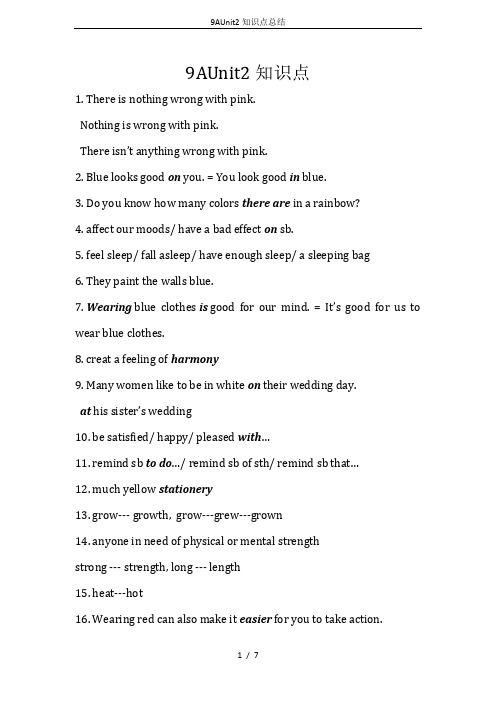
9AUnit2知识点1. There is nothing wrong with pink.Nothing is wrong with pink.There isn’t anything wrong with pink.2. Blue looks good on you. = You look good in blue.3. Do you know how many colors there are in a rainbow?4. affect our moods/ have a bad effect on sb.5. feel sleep/ fall asleep/ have enough sleep/ a sleeping bag6. They paint the walls blue.7. Wearing blue clothes is good for our mind. = It’s good for us to wear blue clothes.8. creat a feeling of harmony9. Many women like to be in white on their wedding day.at his sister’s wedding10. be satisfied/ happy/ pleased with…11. remind sb to do…/ remind sb of sth/ remind sb that…12. much yellow stationery13. grow--- growth, grow---grew---grown14. anyone in need of physical or mental strengthstrong --- strength, long --- length15. heat---hot16. Wearing red can also make it easier for you to take action.17. have difficulty making a decisiondecide --- decision18. sad---sa dd er, (thin, slim, red, fat, hot, wet, mad)19. the best color to represent Lisa20. require / need sb to do…need doing… =need to be done21. My school is far away.My school is far (away) from my home.My school is 10km away from my home.22. He preferred walking to jogging.= He would rather walk than jog.He would rather (not) walk.= He preferred (not) to walk.23. in the fitting roomfit --- fi tt ing---fi t ness24. be in a bad mood25. make a phone call to sb= call / phone sbEg. A phone call ___________ (make) to him yesterday.26. He made sure that nobody could hear what he was saying. be sure to do …/ be sure of sth./ be sure that …make sure that/ to do …27. act normally28. They try to find some food in the bag but they found none left.nothing/ none/ nobody29. None of us like/ likes the idea.30. No one knows what’s wrong with him?what happened to him?which is the way to the bus station?who is the victim?= who the victim is?31. We promise to help you successfully change your moods.promise (not) to do…/ promise sb to do…32. get your money back33. Get up early, and you will catch the early bus.or you won’t catch the early bus.34. rub oil into people’s skinrub---ru bb er---rubbed35. feel calm/ calm down/ calm and peace36. Red and white are a good match.37. The powerful red balances the calm white.38. It must be someone else’s.It cannot be his father’s.39. interest ---interesting---interested, affect---effect, pure---purity, warm---warmth, relax---relaxing---relaxed, sleep---sleepy---asleep---sleeping, stress---stressed, create---creative,comfortable---uncomfortable--- comfortably, srong---strength, decide --- decision,heat---hot,grow--- growth ---grew---grown,sad---sadder---sadness, fit--fitting---fitness,rub---rubber---rubbed, happy--- happiness---unhappy, advice---advise,act---actor---actress---action---active---inactive---activity---actively 1. There is nothing wrong with pink.Nothing is wrong with pink.There isn’t anything wrong with pink.2. Blue looks good on you. = You look good in blue.3. Do you know how many colors there are in a rainbow?4. affect our moods/ have a bad effect on sb.5. feel sleep/ fall asleep/ have enough sleep/ a sleeping bag6. They paint the walls blue.7. Wearing blue clothes is good for our mind. = It’s good for us to wear blue clothes.8. creat a feeling of harmony9. Many women like to be in white on their wedding day.at his sister’s wedding10. be satisfied/ happy/ pleased with…11. remind sb to do…/ remind sb of sth/ remind sb that…12. much yellow stationery13. grow--- growth, grow---grew---grown14. anyone in need of physical or mental strengthstrong --- strength, long --- length15. heat---hot16. Wearing red can also make it easier for you to take action.17. have difficulty making a decisiondecide --- decision18. sad---sa dd er, (thin, slim, red, fat, hot, wet, mad)19. the best color to represent Lisa20. require / need sb to do…need doing… =need to be done21. My school is far away.My school is far (away) from my home.My school is 10km away from my home.22. He preferred walking to jogging.= He would rather walk than jog.He would rather (not) walk.= He preferred (not) to walk.23. in the fitting roomfit --- fi tt ing---fi t ness24. be in a bad mood25. make a phone call to sb= call / phone sbEg. A phone call ___________ (make) to him yesterday.26. He made sure that nobody could hear what he was saying.be sure to do …/ be sure of sth./ be sure that …make sure that/ to do …27. act normally28. They try to find some food in the bag but they found none left. nothing/ none/ nobody29. None of us like/ likes the idea.30. No one knows what’s wrong with him?what happened to him?which is the way to the bus station?who is the victim?= who the victim is?31. We promise to help you successfully change your moods.promise (not) to do…/ promise sb to do…32. get your money back33. Get up early, and you will catch the early bus.or you won’t catch the early bus.34. rub oil into people’s skinrub---ru bb er---rubbed35. feel calm/ calm down/ calm and peace36. Red and white are a good match.37. The powerful red balances the calm white.38. It must be someone else’s.It cannot be his father’s.39. interest ---interesting---interested, affect---effect, pure---purity, warm---warmth, relax---relaxing---relaxed, sleep---sleepy---asleep---sleeping, stress---stressed, create---creative, comfortable---uncomfortable--- comfortably, srong---strength, decide --- decision,heat---hot,grow--- growth ---grew---grown,sad---sadder---sadness, fit--fitting---fitness,rub---rubber---rubbed, happy--- happiness---unhappy, advice---advise,act---actor---actress---action---active---inactive---activity---actively。
译林版牛津英语 9A unit2 单元知识详细讲解

I don't know if/ whether he will come this afternoon.
I didn't know if/ whether he would come this afternoon.
4. calm (adj.)平静的,沉着的;(v)使平静(n.) 平静;安静
① 保持冷静/平静
4. I like bicycles, but I can’t afford to buy_o__n_e__.
5.The bike which I want to buy is more beautiful than
_t_h__a_t__ he has.
6.There were a few young people and some older _o_n__e_s___
A. it;one
B.one;one C.one;it D.it;it
2.There are many computers here. Whicho__n_e_ do you
want to buy?
3. The weather here is different from _th__o_s_e_in Hainan.
There's a pair of sunglasses on the bed. Can I try them on?
4. And I’m not sure if blue looks good on you.
Blue looks good on you. = You look good _i_n_ blue.
A.what can we do
B.what we can do
C.how can we do
9A Unit 2 知识点归纳
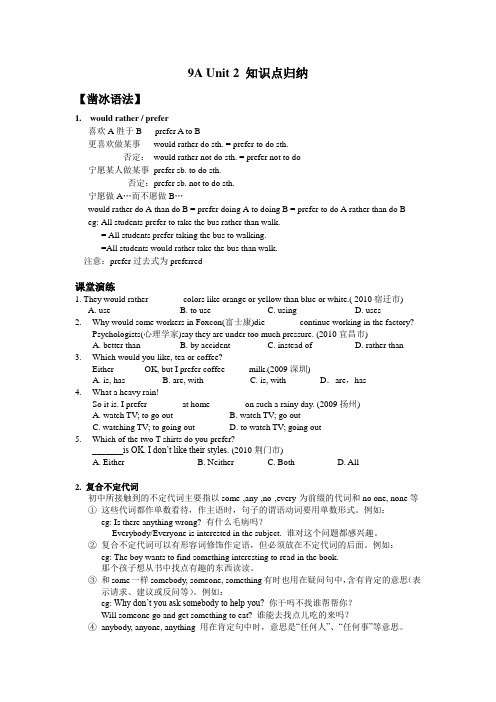
9A Unit 2 知识点归纳【凿冰语法】1.would rather / prefer喜欢A胜于B prefer A to B更喜欢做某事would rather do sth. = prefer to do sth.否定:would rather not do sth. = prefer not to do宁愿某人做某事prefer sb. to do sth.否定:prefer sb. not to do sth.宁愿做A…而不愿做B…would rather do A than do B = prefer doing A to doing B = prefer to do A rather than do B eg: All students prefer to take the bus rather than walk.= All students prefer taking the bus to walking.=All students would rather take the bus than walk.注意:prefer过去式为preferred课堂演练1. They would rather _______ colors like orange or yellow than blue or white.( 2010宿迁市)A. useB. to useC. usingD. uses2. ---Why would some workers in Foxcon(富士康)die _______ continue working in the factory? ---Psychologists(心理学家)say they are under too much pressure. (2010宜昌市)A. better thanB. by accidentC. instead ofD. rather than3. ---Which would you like, tea or coffee?---Either ______ OK, but I prefer coffee _____milk.(2009深圳)A. is, hasB. are, withC. is, with D.are,has4. ---What a heavy rain!---So it is. I prefer _______ at home _______ on such a rainy day. (2009扬州)A. watch TV; to go outB. watch TV; go outC. watching TV; to going outD. to watch TV; going out5. ---Which of the two T-shirts do you prefer?---_______is OK. I don’t like their styles. (2010荆门市)A. EitherB. NeitherC. BothD. All2. 复合不定代词初中所接触到的不定代词主要指以some-,any-,no-,every-为前缀的代词和no one, none等①这些代词都作单数看待,作主语时,句子的谓语动词要用单数形式。
9A Unit2知识点归纳
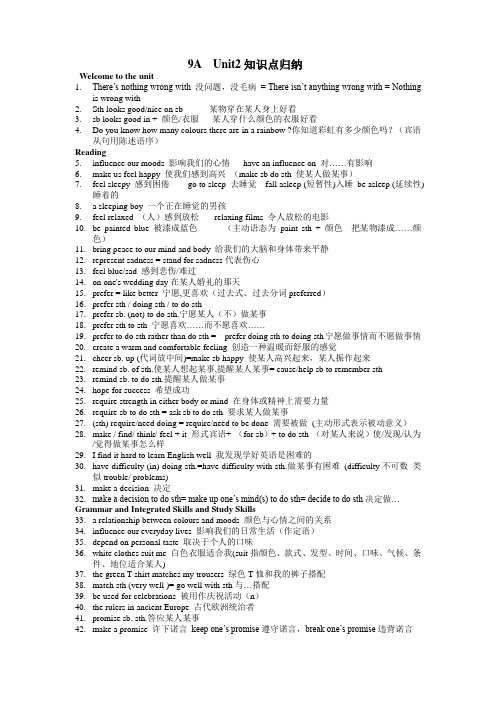
9A Unit2知识点归纳Welcome to the unit1.There’s nothing wrong with 没问题,没毛病= There isn’t anything wrong with = Nothingis wrong with2.Sth looks good/nice on sb 某物穿在某人身上好看3.sb looks good in + 颜色/衣服某人穿什么颜色的衣服好看4.Do you know how many colours there are in a rainbow ?你知道彩虹有多少颜色吗?(宾语从句用陈述语序)Reading5.influence our moods 影响我们的心情have an influence on 对……有影响6.make us feel happy 使我们感到高兴(make sb do sth 使某人做某事)7.feel sleepy 感到困倦---- go to sleep 去睡觉---fall asleep (短暂性)入睡be asleep (延续性)睡着的8. a sleeping boy 一个正在睡觉的男孩9.feel relaxed (人)感到放松--- relaxing films 令人放松的电影10.be painted blue 被漆成蓝色(主动语态为paint sth + 颜色把某物漆成……颜色)11.bring peace to our mind and body 给我们的大脑和身体带来平静12.represent sadness = stand for sadness代表伤心13.feel blue/sad 感到悲伤/难过14.on one's wedding day在某人婚礼的那天15.prefer = like better 宁愿,更喜欢(过去式、过去分词preferred)16.prefer sth / doing sth / to do sth17.prefer sb. (not) to do sth.宁愿某人(不)做某事18.prefer sth to sth 宁愿喜欢……而不愿喜欢……19.prefer to do sth rather than do sth = prefer doing sth to doing sth宁愿做事情而不愿做事情20.create a warm and comfortable feeling 创造一种温暖而舒服的感觉21.cheer sb. up (代词放中间)=make sb happy 使某人高兴起来,某人振作起来22.remind sb. of sth.使某人想起某事,提醒某人某事= cause/help sb to remember sth23.remind sb. to do sth.提醒某人做某事24.hope for success 希望成功25.require strength in either body or mind 在身体或精神上需要力量26.require sb to do sth = ask sb to do sth 要求某人做某事27.(sth) require/need doing = require/need to be done 需要被做(主动形式表示被动意义)28.make / find/ think/ feel + it 形式宾语+ (for sb)+ to do sth (对某人来说)使/发现/认为/觉得做某事怎么样29.I find it hard to learn English well 我发现学好英语是困难的30.have difficulty (in) doing sth.=have difficulty with sth.做某事有困难(difficulty不可数类似trouble/ problems)31.make a decision 决定32.make a decision to do sth= make up one’s mind(s) to do sth= decide to do sth决定做…Grammar and Integrated Skills and Study Skills33. a relationship between colours and moods 颜色与心情之间的关系34.influence our everyday lives 影响我们的日常生活(作定语)35.depend on personal taste 取决于个人的口味36.white clothes suit me 白色衣服适合我(suit指颜色、款式、发型、时间、口味、气候、条件、地位适合某人)37.the green T-shirt matches my trousers 绿色T恤和我的裤子搭配38.match sth (very well )= go well with sth与…搭配39.be used for celebrations 被用作庆祝活动(n)40.the rulers in ancient Europe 古代欧洲统治者41.promise sb. sth.答应某人某事42.make a promise 许下诺言keep one’s promise遵守诺言,break one’s promise违背诺言43.promise v.允诺;答应→promise to do sth答应做某事→ promise sb (not) to do sth答应某人(不)做某事→promise (sb) that从句,e.g. ①Mom, I promise I'll study harder.44.The medicine worked 药物奏效了(work vi 奏效,起作用,产生预期的效果)45.practise colour therapy 从事/实践颜色疗法46.suggest sth to sb 向某人建议某事(但不能说suggest sb sth 名词形式为suggestion,可数名词)47.suggest doing sth 建议做某事48.suggest me/ my doing sth 建议我做某事49.give you free clothes 给你免费的衣服50.would rather (not) do sth 宁愿做/ 不做某事51.would rather do sth than do sth宁愿做做某事而不愿做某事52.be dressed in blue 穿蓝色衣服(表示状态)53.have the power to drive evil spirits away 颜色有赶走邪灵的力量54.dress baby boys in blue 给男婴穿蓝色Task55.feel a little bit stressed 感觉有一点压力(“一点儿”只修饰adj ,adv )56. a little water = a bit of water (a little可修饰不可数名词也可修饰adj, adv;a bit of 只修饰不可数名词)57.It’s a little cold today = It’s a little bit cold today = It’s a bit cold today 今天天气有点儿冷58. a good match 一个很好的搭配(n)59.as the powerful red balances the calm white 因为强烈的红色可以平衡宁静的白色译林英语60.But there’s nothing wrong with pink, you know.但是你知道,粉红色没有什么不好的。
9aunit2词汇知识重点

28. suggest v.建议 suggest doing sth.建议做某事
advise v. 建议 advise sb. to do sth.建议某人做某事 suggestion n.建议 c. advice n. 建议 u.
29.would rather更喜欢 would rather do sth. 更喜欢做某事 do A than do B
பைடு நூலகம்
17. decision n.决定 – decide v. 决定 decide to do sth. 决定做某事 make a decision to do sth. 决定做某事 make up one’s mind to do sth.下定决心做某事
18. certainly=sure=of course当然
Unit2词汇知识要点:
1. mood: be in a good/bad mood…有好/坏心情 2. influence v. influence our moods
影响 n. have an influence on our moods
3. whether conj.是否 weather n. 天气 …whether he is right or not …if he is right
4. calm down平静下来 come down 坍塌
5. relaxed adj. 放松的 relaxing adj. 放松的 relax v. 放松
6. peace n. 和平 peaceful adj. 和平的 peacefully adv. 和平地
7. sadness n.悲伤 happiness n.快乐= joy
牛津译林版9A英语 Unit 2重点短语、句型

Unit 21.try sth on/try on sth试穿...try it/them on试穿它/它们2.(1)There is something wrong with.../Something is wrong with... ...有问题(2)There is nothing wrong with.../Nothing is wrong with.... ...没问题3.on their wedding day在他们结婚的日子4.sb doubt/be not sure if/whether引导的宾语从句某人怀疑/不确定是否....sb don’t doubt /be sure that 引导的宾语从句某人不怀疑/确定 .....5.sb looks good in sth某人穿...好看Sth look good on sb ...穿在某人身上好看6.explain sth to sb向某人解释....plain about sth to sb=complain to sb about sth 向某人抱怨某事8.walk into sp=enter sp进入某地9.paint sth +颜色把...涂成...色变被动: sth be painted+颜色 ...被涂成...色10.the colour of purity/sun/wisdom/nature/envy 纯洁/太阳/智慧/自然/妒忌的颜色11.prefer A to B=would rather A than B=like A better than B与B相比更喜欢A=宁愿A也不愿Bprefer to do sth=would rather do sth更喜欢做某事=宁愿做某事prefer doing A to doing B=would rather do A than do B与做B相比更喜欢做A这件事=宁愿做A这件事而不愿做B这件事prefer doing A to B=would rather do A than B与做B相比更喜欢做A这件事=宁愿做A这件事而不愿做B这件事prefer to do sth rather than do sth更喜欢做某事而不愿做某事12.cheer sb up使某人振奋/开心起来13.re mind sb of sth使某人想起某事remind sb to do sth提醒某人做某事14.hope for success希望成功15.require strength需要力量16.be of some help to sb=be helpful to sb对某人是有帮助的17.sb make/believe/find/think...+it+adj+to do sth某人使得/相信/发现/认为做某事怎么样18.sb have difficulty/trouble/problems with sth某人在...方面有困难/麻烦/问题sb have difficulty/trouble/problems(in)doing sth 某人在做...方面有困难/麻烦/问题19.decide to do sth决定做某事make a decision 做一个决定20.instead of+n/n短语代替、而不是...21.write back回信22.sb be not certain/sure...某人不确定23.the power of colours颜色的力量24.improve your life改变你的生活25.get your money back拿回你的钱26.practise doing sth练习做某事27.feel stressed/tired/sad...感到有压力的/累的/悲伤的28.suggest doing sth建议做某事suggest sb /one’s doing sth建议某人做某事suggest sb/sth to sb把某人/某事建议给某人sb suggest that+句子某人建议...29.dress sb in +颜色/衣服给某人穿...sb be dressed in +颜色/衣服=sb be in +颜色/衣服某人穿着....30....be important to sb. ...对某人来说是重要的31.sb/sth be influenced by...某人/某物被...影响32.drive sb/sth away赶走某人/某物33. in the hope that+句子希望...34.according to sth/doing sth根据(做)...35.calm down冷静下来36.a little bit+adj=a little+adj=a bit+adj一点点怎么样a little+un=a bit of+un一点点...37.a little bit stressed=a little stressed=a bit stressed一点点压力的。
9AUnit2知识点归纳
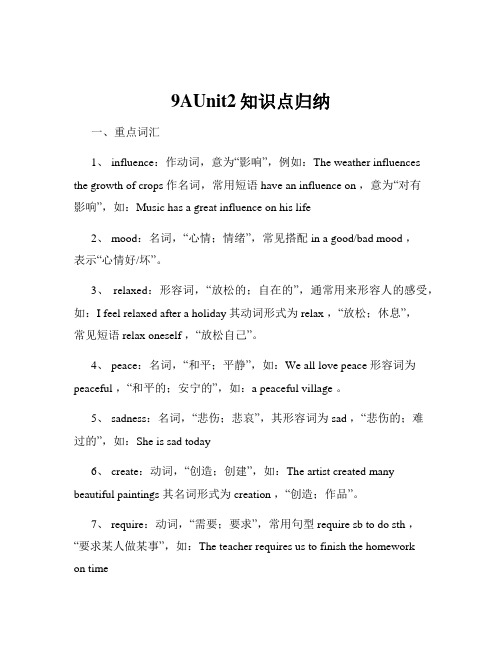
9AUnit2知识点归纳一、重点词汇1、 influence:作动词,意为“影响”,例如:The weather influences the growth of crops 作名词,常用短语 have an influence on ,意为“对有影响”,如:Music has a great influence on his life2、 mood:名词,“心情;情绪”,常见搭配 in a good/bad mood ,表示“心情好/坏”。
3、relaxed:形容词,“放松的;自在的”,通常用来形容人的感受,如:I feel relaxed after a holiday 其动词形式为 relax ,“放松;休息”,常见短语 relax oneself ,“放松自己”。
4、 peace:名词,“和平;平静”,如:We all love peace 形容词为peaceful ,“和平的;安宁的”,如:a peaceful village 。
5、 sadness:名词,“悲伤;悲哀”,其形容词为 sad ,“悲伤的;难过的”,如:She is sad today6、 create:动词,“创造;创建”,如:The artist created many beautiful paintings 其名词形式为 creation ,“创造;作品”。
7、 require:动词,“需要;要求”,常用句型 require sb to do sth ,“要求某人做某事”,如:The teacher requires us to finish the homeworkon time8、certain:形容词,“某些;某个”,常用短语be certain of/about ,“对有把握”,如:I'm certain of my success 其副词形式为 certainly ,“当然;一定”。
二、重点短语1、 be in a bad mood :心情不好2、 cheer sb up :使某人高兴起来3、 remind sb of sth :使某人想起某事4、 hope for :希望;盼望5、 be filled with :充满6、 be satisfied with :对满意7、 have difficulty (in) doing sth :做某事有困难8、 make a decision :做决定9、 try one's best :尽力10、 keep doing sth :一直做某事11、 give up :放弃12、 be proud of :为感到骄傲13、 instead of :代替;而不是三、重点句型1、“I'm feeling blue” 这是一个常用的表达心情的句子,“feel +形容词”表示“感觉”,blue 在这里表示“忧郁的;沮丧的”。
牛津译林版英语9A Unit2 语法讲解

matches your characteristics?
宾语从句
•在句子中起宾语作用的从句叫做宾语从句。
•宾语从句分为三类:动词的宾语从句,介词
的宾语从句和形容词的宾语从句。
•宾语从句过"三关":时态,语序,连词。
that 引导的宾语从句
一、宾语从句的连接词:从属连词 . 从句为陈述句,常选择引导词that或将that 省略,直接与主句相连。 2. 从句为一般疑问句,常选择引导词if或 whether。在 whether … or not 结构中不能 用 if 替换。 3. 从句为特殊疑问句,常选择what, when, where, which, who, how等疑问代词、疑问副 词作引导词。 注意:当who为主语时,句式 为:who+谓语+其他。
3. 介词+宾语从句 (1) 介词引导的wh-类宾语从句。 • We are talking about whether we admit students into our club. 我们正在讨论是否让学生加入我们的俱乐 部. • The new book is about how Shenzhou 6 manned spaceship was sent up into space. 这本新书是关于神州6号载人航天飞船是 如何升如太空的.
动词的宾语从句
二、宾语从句
分为三类:
形容词的宾语从句 介词 的宾语从句
1. 动词+宾从句 大多数及物动词都可以带宾语从句。 常见的动词有:say, think, wish, hope, see, believe, agree, expect, hear, feel等。 • He thinks that he can go swimming tomorrow. 他认为他明天能去游泳。 • I do not believe (that) he has never been to the USA. 我不相信他从没去过美国。
牛津译林9A Unit2知识点讲解
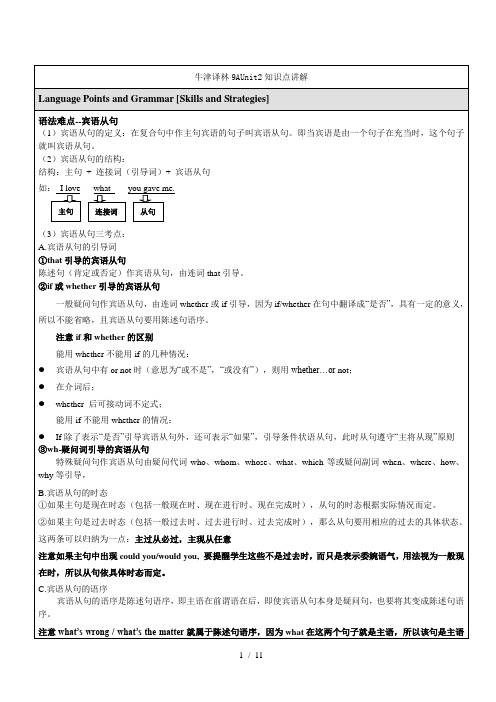
2) influence vt. 影响influence是及物动词,侧重指“环境等外界因素对人的长期影响”,与affect同义。
be influenced by意“受……的影响”。
1. 老师的话对我影响很大。
2. 人们也受到古老故事的影响。
[拓展]influence也可作名词。
have an influence on…意为“对……有影响”。
Violent films have a bad influence on the children.暴力影片对孩子们有不良影响。
出题方式:单选/单词2)could be意为“可能是”may/might be意为“可能是”,might be语气比may be更弱。
The boy might be in his bedroom.must be意为“一定是”,表示很有把握的推测。
This dictionary must be Ning’s. It has her name on it.出题方式:单选a)I’m sure this book ___ Li Lei’s,because there is his name on it.A.can’t beB.may beC.might beD.must beb)---Will you answer the telephone?It ___ be your mother.---Sorry.I ____.I’m busy.A.can; mustn’tB.may; won’tC.may; can’tD.need; will3)I'd rather wear orange. 我宁愿穿橙色。
[点拨] would rather意为“宁愿,宁可”,后接动词原形。
常省略为“'d rather”,表示“优先选择的一种方式”,相当于prefer to do sth。
其否定形式是would rather not do sth。
九年级英语上册 Unit 2知识梳理 牛津译林版
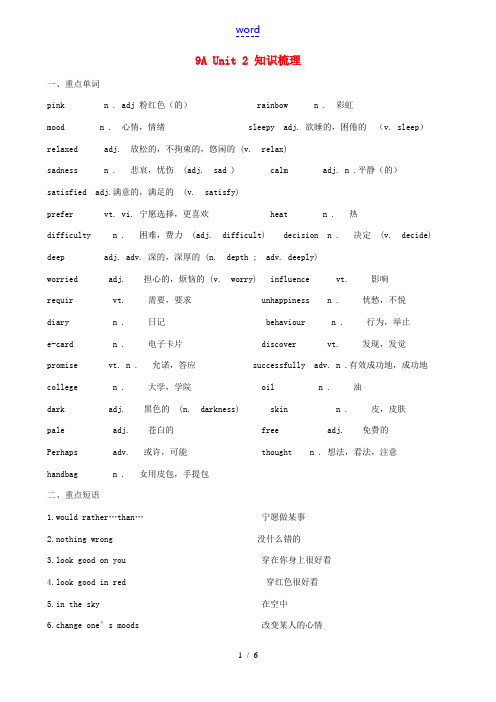
9A Unit 2 知识梳理一、重点单词pink n . adj 粉红色(的) rainbow n . 彩虹mood n . 心情,情绪 sleepy adj. 欲睡的,困倦的(v. sleep)relaxed adj. 放松的,不拘束的,悠闲的 (v. relax)sadness n . 悲哀,忧伤 (adj. sad ) calm adj. n .平静(的)satisfied adj.满意的,满足的 (v. satisfy)prefer vt. vi. 宁愿选择,更喜欢 heat n . 热difficulty n . 困难,费力 (adj. difficult) decision n . 决定 (v. decide) deep adj. adv. 深的,深厚的 (n. depth ; adv. deeply)worried adj. 担心的,烦恼的 (v. worry) influence vt. 影响requir vt. 需要,要求 unhappiness n . 忧愁,不悦diary n . 日记 behaviour n . 行为,举止e-card n . 电子卡片 discover vt. 发现,发觉promise vt. n . 允诺,答应 successfully adv. n .有效成功地,成功地college n . 大学,学院 oil n . 油dark adj. 黑色的 (n. darkness) skin n . 皮,皮肤pale adj. 苍白的 free adj. 免费的Perhaps adv. 或许,可能 thought n . 想法,看法,注意handbag n . 女用皮包,手提包二、重点短语1.would rather…than… 宁愿做某事2.nothing wrong 没什么错的3.look good on you 穿在你身上很好看4.look good in red 穿红色很好看5.in the sky 在空中6.change one’s moods 改变某人的心情7.prefer to do sth =would rather do sth 宁愿做某事8.cheer up 高兴起来9.remind sb of 使某人想起某事10.take action 采取措施11.make a decision 下定决心12.be in a bad mood 处于坏心情13.keep doing sth 一直做某事14.make phone calls to 打给15.make sure 确保,确信16.think of 考虑17.give sb some advice 给某人一些建议18.what to wear 穿什么19.look more powerful 看起来很有力量20.a little bit stressed 有一点压力,焦虑21.a good match 好搭配22.be on holiday 在度假23.something strange 奇怪的事24.just like 就象25.show sth to sb 把某物展示给某人看26.put …on one’s home page 把……放在网页上27.affect our moods 影响我们的心情28.create a feeling of harmony 产生一种和谐感29.be good for our mind and our body 对我们的大脑和身体有好处30.the colour of wisdom 智慧之色31.the yellow stationery 黄色的文具32.in need of 在……的需求中33.in a bad mood 处于一种坏的心情34.make sb +adj. 使某人处于某种状态35.make sb. do sth 让某人做某事36.would rather do A than do B=prefer doing A to doing B 宁愿做A事也不做B事37.三、重点句型1.would rather do sth than do sth (接动词原形) 比较某事而言更喜欢做某事I’d rather wear blue than pink.2.I’ve just seen a rainbow in the sky. 我刚在看见空中有一道彩虹。
9AUnit 2 重点单词短语句子
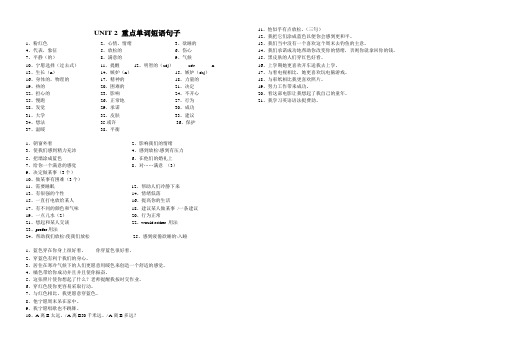
UNIT 2 重点单词短语句子1、粉红色2、心情、情绪3、欲睡的4、代表,象征5、放松的6、伤心7、平静(的)8、满意的9、气候10、宁愿选择(过去式)11、提醒12、明智的(adj)adv n 13、生长(n)14、嫉妒(n)15、嫉妒(daj)16、身体的,物理的17、精神的18、力量的19、热的20、困难的21、决定22、担心的23、影响24、不开心25、慢跑26、正常地27、行为28、发觉29、承诺30、成功31、大学32、皮肤33、建议34、想法35或许36、保护37、温暖38、平衡1、朝窗外看2、影响我们的情绪3、使我们感到精力充沛4、感到放松\感到有压力5、把墙涂成蓝色6、在他们的婚礼上7、给你一个满意的感觉8、对……满意(3)9、决定做某事(3个)10、做某事有困难(3个)11、需要睡眠12、帮助人们冷静下来13、有很强的个性14、情绪低落15、一直打电放给某人16、提高你的生活17、有不同的颜色和气味18、建议某人做某事/一条建议19、一点儿水(2)20、行为正常21、想起和某人交谈22、would rather 用法23、prefer用法24、帮助我们放松\使我们放松25、感到疲倦欲睡的\入睡1、蓝色穿在你身上很好看。
你穿蓝色很好看。
2、穿蓝色有利于我们的身心。
3、居住在寒冷气候下的人们更愿意用暖色来创造一个舒适的感觉。
4、橘色带给你成功并且并且使你振奋。
5、这张照片使你想起了什么?老师提醒我按时交作业。
6、穿红色使你更容易采取行动。
7、与红色相比,我更愿意穿蓝色。
8、他宁愿周末呆在家中。
9、我宁愿唱歌也不跳舞。
10、A离B太远。
/ A离B50千米远。
/ A离B多远?11、他似乎有点放松。
(三句)12、我把它们涂成蓝色以便你会感到更和平。
13、我们当中没有一个喜欢这个周末去钓鱼的主意。
14、我们承诺成功地帮助你改变你的情绪,否则你就拿回你的钱。
15、黑皮肤的人们穿红色好看。
16、上学期她更喜欢开车送我去上学。
译林英语九年级上册第二单元unit 2重要知识点归纳
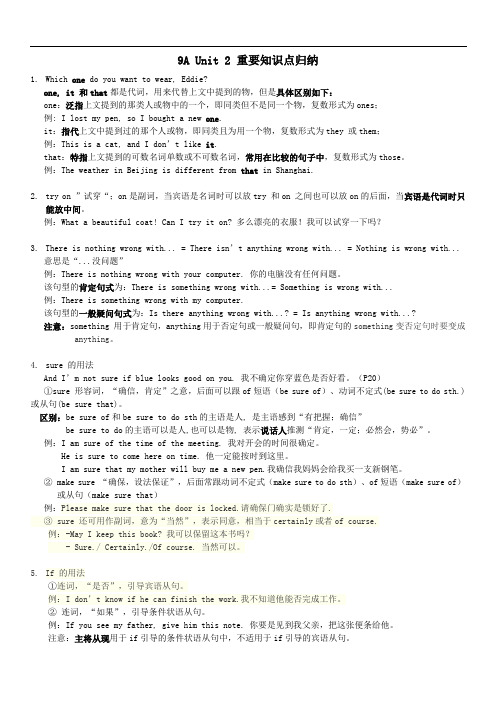
9A Unit 2 重要知识点归纳1.Which one do you want to wear, Eddie?one, it 和that都是代词,用来代替上文中提到的物,但是具体区别如下:one:泛指上文提到的那类人或物中的一个,即同类但不是同一个物,复数形式为ones;例: I lost my pen, so I bought a new one.it:指代上文中提到过的那个人或物,即同类且为用一个物,复数形式为they 或them;例:This is a cat, and I don’t like it.that:特指上文提到的可数名词单数或不可数名词,常用在比较的句子中,复数形式为those。
例:The weather in Beijing is different from that in Shanghai.2.try on ”试穿“;on是副词,当宾语是名词时可以放try 和on 之间也可以放on的后面,当宾语是代词时只能放中间。
例:What a beautiful coat! Can I try it on? 多么漂亮的衣服!我可以试穿一下吗?3.There is nothing wrong with... = There isn’t anything wrong with... = Nothing is wrong with...意思是“...没问题”例:There is nothing wrong with your computer. 你的电脑没有任何问题。
该句型的肯定句式为:There is something wrong with...= Something is wrong with...例:There is something wrong with my computer.该句型的一般疑问句式为:Is there anything wrong with...? = Is anything wrong with...?注意:something 用于肯定句,anything用于否定句或一般疑问句,即肯定句的something变否定句时要变成anything。
9A重点语法解析 unit2

Unit 2 Colour课文重要知识点讲解1.I'd rather wear blue than pink. 我宁愿穿蓝色也不愿穿粉红色。
解析:would rather + 动词原形+ than + 动词原形。
译为“宁可······也不”“与其······不如······”。
e.g. I would rather stay at home than go out. 我宁愿呆在家里而不愿出去。
Liu Hulan would rather die than give up. 刘胡兰宁死不屈。
would rather not do sth.宁愿不做某事e.g. I would rather not tell you about it. 我宁愿没有告诉你。
She would rather not run. 她宁愿没有跑步。
2.There is nothing wrong with pink. 粉红色没什么不好。
解析:There is something wrong with... ······坏了/出问题了。
其同义结构为:sth. is wrong with...eg: There is something wrong with my bike, so I am late. 我的自行车坏了,所以我迟到了。
Something was wrong with my watch. 我的手表坏了。
3.Blue looks good on you. 蓝色穿在你身上很好看。
解析:衣服+look nice/good+on sb. 指衣服好看,衣服穿在人身上用on。
人+look nice/good+in+衣服指人好看,人在衣服里面用in。
02最新牛津译林版 9A Unit 2 Colors知识点讲解
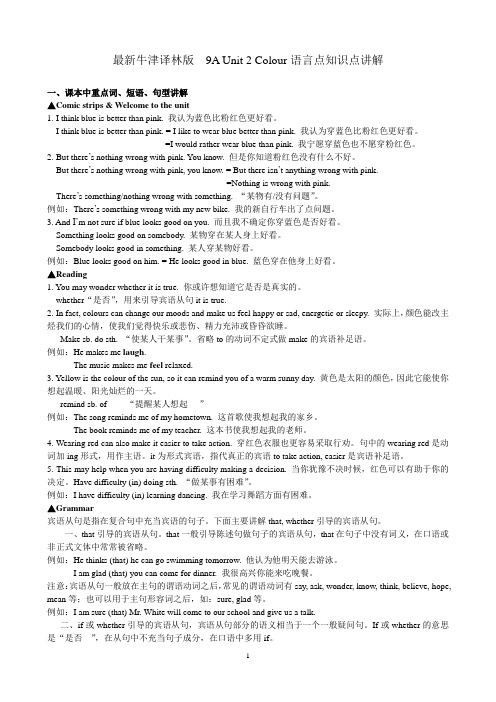
最新牛津译林版9A Unit 2 Colour语言点知识点讲解一、课本中重点词、短语、句型讲解▲Comic strips & Welcome to the unit1. I think blue is better than pink. 我认为蓝色比粉红色更好看。
I think blue is better than pink. = I like to wear blue better than pink. 我认为穿蓝色比粉红色更好看。
=I would rather wear blue than pink. 我宁愿穿蓝色也不愿穿粉红色。
2. But there’s nothing wrong with pink. You know. 但是你知道粉红色没有什么不好。
But there’s nothing wrong with pink, you know. = But there isn’t anything wrong with pink.=Nothing is wrong with pink.There’s something/nothing wrong with something. “某物有/没有问题”。
例如:There’s something wrong with my new bike. 我的新自行车出了点问题。
3. And I’m not sure if blue looks good on you. 而且我不确定你穿蓝色是否好看。
Something looks good on somebody. 某物穿在某人身上好看。
Somebody looks good in something. 某人穿某物好看。
例如:Blue looks good on him. = He looks good in blue. 蓝色穿在他身上好看。
▲Reading1. You may wonder whether it is true. 你或许想知道它是否是真实的。
2021-2022学年牛津译林版9AUnit2知识点和考点
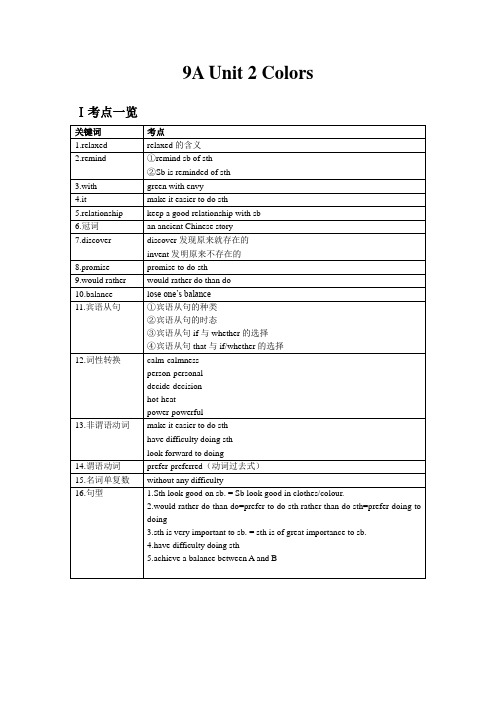
9A Unit 2 Colors Ⅰ考点一览Ⅱ考点考题1.Have you ever walked into a room and felt relaxed?(1)relaxed的基本含义放松的,自在的(2)relaxed的核心考点考察relaxed的含义,与modest(谦虚),energetic(精力充沛的)和organized(有条理的,有效率的)的词义区分。
【2020年科利华】1.---Mum, I’m very nervous before the exam.---Be ______,dear. Your sure to pass it.A. modestB. energeticC. organizedD. relaxed答案D2.Yellow is the colour of sun, so it can remind you of a warm sunny day.(1)remind的基本含义提醒,使...想起(2)remind的核心考点①考察固定搭配remind sb of sth,使某人想起。
②考察remind sb of sth的被动,sb作为remind的宾语,在被动句作主语,即sb is reminded of sth【2020年仙外】2. He can’t remember how many times he needs to __________ of __________ late for school.A. remind; not beingB. be reminded; not beingC. remind; not to beD. be reminded; not to be答案B【2020年南师】3. The forest fire in Sichuan reminded us___________ the importance of keeping safe________any possible danger.A. of,withB. of, fromC. to, fromD. to, with答案B3.However, it is also the color of envy, so we may sometimes say someone is green with envy. (1)green with envy的核心考点考察介词with。
9A Unit2知识点归纳
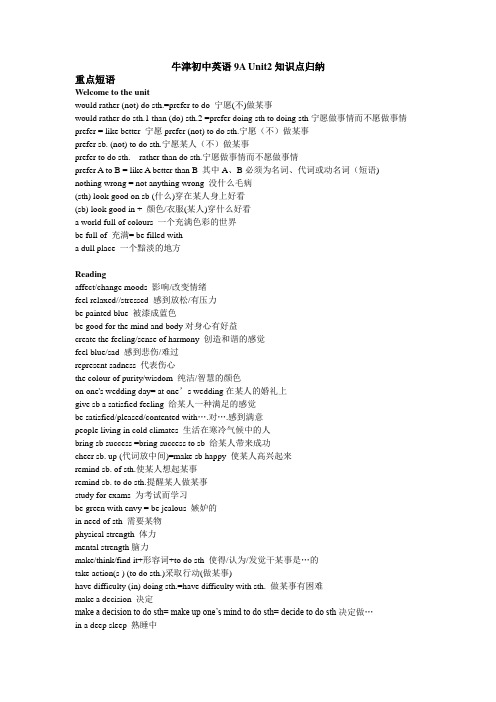
牛津初中英语9A Unit2知识点归纳重点短语Welcome to the unitwould rather (not) do sth.=prefer to do 宁愿(不)做某事would rather do sth.1 than (do) sth.2 =prefer doing sth to doing sth宁愿做事情而不愿做事情prefer = like better 宁愿prefer (not) to do sth.宁愿(不)做某事prefer sb. (not) to do sth.宁愿某人(不)做某事prefer to do sth. rather than do sth.宁愿做事情而不愿做事情prefer A to B = like A better than B 其中A、B必须为名词、代词或动名词(短语) nothing wrong = not anything wrong 没什么毛病(sth) look good on sb (什么)穿在某人身上好看(sb) look good in + 颜色/衣服(某人)穿什么好看a world full of colours 一个充满色彩的世界be full of 充满= be filled witha dull place 一个黯淡的地方Readingaffect/change moods 影响/改变情绪feel relaxed//stressed 感到放松/有压力be painted blue 被漆成蓝色be good for the mind and body对身心有好益create the feeling/sense of harmony 创造和谐的感觉feel blue/sad 感到悲伤/难过represent sadness 代表伤心the colour of purity/wisdom 纯洁/智慧的颜色on one's wedding day= at one’s wedding在某人的婚礼上give sb a satisfied feeling 给某人一种满足的感觉be satisfied/pleased/contented with….对….感到满意people living in cold climates 生活在寒冷气候中的人bring sb success =bring success to sb 给某人带来成功cheer sb. up (代词放中间)=make sb happy 使某人高兴起来remind sb. of sth.使某人想起某事remind sb. to do sth.提醒某人做某事study for exams 为考试而学习be green with envy = be jealous 嫉妒的in need of sth 需要某物physical strength 体力mental strength脑力make/think/find it+形容词+to do sth 使得/认为/发觉干某事是…的take action(s ) (to do sth.)采取行动(做某事)have difficulty (in) doing sth.=have difficulty with sth. 做某事有困难make a decision 决定make a decision to do sth= make up one’s mind to do sth= decide to do sth决定做…in a deep sleep 熟睡中get good marks in the tests 在测试中取得高分calm down 平静下来worry a lot 多虑get stressed 有压力的have a strong personality有鲜明的个性Vocabulary and Grammaraffect = influence = have an effect on 对…有影响(sth) require/need doing = require/need to be done 需要被做require sb to do sth 要求某人做某事in the fitting/dressing room在试衣室里go shopping for clothes 去买衣服be in a good/bad mood 心情很好/差all the afternoon = the whole afternoon整个下午make phone calls to sb 给某人打电话seem to do sth.=It seems+that+从句似乎….one’s strange behaviour 某人的怪异行为act normally 举动正常can’t think of anyone (to talk to )想不到任何(能够交谈的)人there be none left 没有一个/一点剩下colour the card orange 把卡片涂成橙色Integrated Skills and Pronunciationcolour therapy 颜色疗法improve your life 改善你的生活promise you success 保证你成功promise sb. sth.答应某人某事make a promise 许下诺言promise (sb.) to do sth.答应(某人)做某事leave college 大学毕业people with pale/dark skin 长白/黑皮肤的人rub oil into people’s skin把油涂进某人的皮肤里advise sb to do sth 建议某人做某事advise doing sth建议做某事give sb some advice = give some advice to sb 给某人一些建议Main task and Checkouta good match 一个好的搭配feel a little bit stressed 感觉有点紧张重点句子1.I’d rather wear blue than pink.=I prefer wearing blue to wearing pink.我宁愿穿蓝色也不愿穿粉红色2.There’s nothing wrong with pink.=There isn’t anything wrong with pink.=Nothing is wrongwith pink.粉红色没有什么不妥3.Blue looks good on him.=He looks good in blue. 蓝色穿在你身上和很好看。
广州地区沪教牛津版九年级上册9AUnit2Greatminds单词、短语、重点归纳

广州地区沪教牛津版九年级上册9AUnit2Greatminds单词、短语、重点归纳Unit2Greatminds单词Unit 2知识考点★常考短语Sense of human幽默感A series of一系列By heart单凭记忆Lost heart = stop hoping for sthWithout difficult轻而易举= easilyHave no XXX毫不知道Play XXX跟某人开玩笑Join in / take part in参加,加入XXX坐下= sit downXXX point转折点XXXLet…down使…失望= make…disappointedBe in trouble处于困境,倒霉= have problems or difficulties★同义短语a sense of humor.= humorous诙谐let sb down= make sb disappointedbe surrounded by= form a circle roundXXXlead to= causelearn…by heart= rem ember= memorizeXXXXXX = in a short whileattempt to do= try to dojoin in = take part inregard….as…= think of…as…= look on…as….= consider。
as把…看成decide to do= make decision to do= make up one’s mind to do决意做某事have a talent for= have a genius for= have a natural ability for★词义剖析1.XXX.聪明人,富有才智的人扫一扫,听课文He is one of the XXX.n.头脑,脑筋,大脑The movie is still in my XXX.v.介意mind doing sth.Mind +从句Do you mind if I turn on the TV.2.Many people consider Albert XXX.consider及物动词,意为“认为;觉得”。
译林版]9A各单元知识点归纳整理
![译林版]9A各单元知识点归纳整理](https://img.taocdn.com/s3/m/cbb40c70b207e87101f69e3143323968011cf49a.png)
译林版]9A各单元知识点归纳整理Unit 1 Know YourselfKey Phrases:1) make sb do sth - to make someone do something2) feel good - to have a good feeling。
feel well - to be in good health3) well organized - to be very organized4) people with different personalities - individuals with different character traits5) keep sth in good order - to maintain good order of something6XXX7) patient enough - having enough patience8) repeat sth for sb - to repeat something for someone9) be us about sth - to be interested and us about something10) come up with sth = think of sth - to think of something11) get angry easily - XXX12) a born artist - a natural artist13) XXX - to be a good accountant14) impress sb with sth - to leave an XXX15) work without speaking all day long - to work all day without speaking16) win high praise - to receive high praise17) give up sth/give up doing sth - to abandon something or。
9A unit 2 知识点归纳
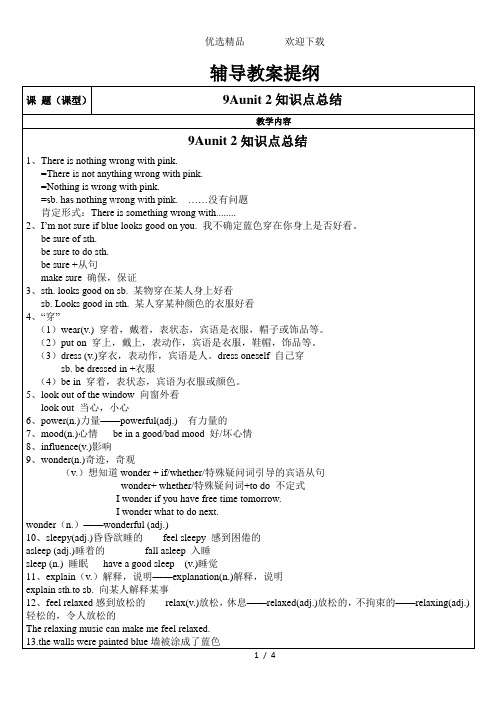
辅导教案提纲课题(课型)9Aunit 2知识点总结教学内容9Aunit 2知识点总结1、There is nothing wrong with pink.=There is not anything wrong with pink.=Nothing is wrong with pink.=sb. has nothing wrong with pink. ……没有问题肯定形式:There is something wrong with........2、I’m n ot sure if blue looks good on you. 我不确定蓝色穿在你身上是否好看。
be sure of sth.be sure to do sth.be sure +从句make sure 确保,保证3、sth. looks good on sb. 某物穿在某人身上好看sb. Looks good in sth. 某人穿某种颜色的衣服好看4、“穿”(1)wear(v.) 穿着,戴着,表状态,宾语是衣服,帽子或饰品等。
(2)put on 穿上,戴上,表动作,宾语是衣服,鞋帽,饰品等。
(3)dress (v.)穿衣,表动作,宾语是人。
dress oneself 自己穿sb. be dressed in +衣服(4)be in 穿着,表状态,宾语为衣服或颜色。
5、look out of the window 向窗外看look out 当心,小心6、power(n.)力量——powerful(adj.) 有力量的7、mood(n.)心情be in a good/bad mood 好/坏心情8、influence(v.)影响9、wonder(n.)奇迹,奇观(v.)想知道wonder + if/whether/特殊疑问词引导的宾语从句wonder+ whether/特殊疑问词+to do 不定式I wonder if you have free time tomorrow.I wonder what to do next.wonder(n.)——wonderful (adj.)10、sleepy(adj.)昏昏欲睡的feel sleepy 感到困倦的asleep (adj.)睡着的fall asleep 入睡sleep (n.) 睡眠have a good sleep (v.)睡觉11、explain(v.)解释,说明——explanation(n.)解释,说明explain sth.to sb. 向某人解释某事12、feel relaxed感到放松的relax(v.)放松,休息——relaxed(adj.)放松的,不拘束的——relaxing(adj.)轻松的,令人放松的The relaxing music can make me feel relaxed.13.the walls were painted blue墙被涂成了蓝色14.It brings peace to our mind and body.15.peace(n.)和平,安宁——peaceful(adj.)和平的,安宁的16.sad(adj.)悲伤的——sadness(n.)悲哀,忧伤——sadly(adv.)悲伤地17.Feel blue=feel sad18.Purity(n.)纯洁——pure(adj.)纯洁的19.Many people like to wear white on their wedding day.20.feel warmwarm(adj.)温暖的——warmly(adv.)温暖地,热切地——warmth(n.)温暖,暖和,热情21.Prefer(v.)宁愿,选择,更喜欢常用结构有:Prefer +n./pron/doing sth.更喜欢……Prefer sth. to sth.比起某物来更喜欢某物Prefer to do sth.更喜欢做某事Prefer doing sth. to doing sth.比起做某事更喜欢做某事Prefer to do sth.rather than do sth.宁愿做某事而不愿做另一件事=would rather do sth. than do sth.22.cheer(n.)喝彩cheers 干杯(v.)cheer sb.up 使某人振作起来cheer for 为……喝彩cheerful(adj.) 快乐的23.remind sb. of sth.使某人想起某事remind sb.to do sth.提醒某人做某事24.hope for success 期望成功25.Success(n.)成功successful(adj.)成功的be successful in sth./doing sth.在某方面成功successfully(adv.)成功地succeed(v.)成功——succeeded——succeededsucceed in doing sth.成功的做某事26.green with envy妒忌的,眼红的27.require (v.)需要strength 力量require sth.需要某物require sb to do sth.要求某人做某事require doing sth.=reauire to be done 需要做某事(含有被动意义)Strong(adj.)强壮的—— strength(n)力量——strengthen (v.) 加强28.be of some help to sb.=be helpful to sb.对某人有帮助be of +n.=be +adj.be of value =be valuable珍贵的有价值的be of importance=be important重要的29.Wearing red can also make it easier to take action. (it 为形式宾语)make it +adj.+to do sth.使做某事……30 take action to do sth.采取行动做某事31.have difficulty / trouble/problem (in) doing sth.做某事困难32.make a decision 做决定33.hot(adj.)热的——heat(n.)热,热量34.a relationship between A and B A 和B 的联系35.everyday(adj.)日常的,每天的=daily(adj.)everyday life =daily lifeevery day 每天We should do some exercise every day.36.notice(n.)注意take notice of 注意(v.)notice/see sb. do sth 看到某人做某事的全过程notice/see sb. doing sth 看到某人正在做某事37.It is used for celebration.be used for sth./doing sth. 被用来做某事=be used to do sth.used to do sth.过去常常做某事be used to sth. /doing sth.习惯于做某事38.certain(adj.)确定的——certainly (adv.)确定地,当然be certain to do sth. 确定做某事be certain of doing sth.确定做某事be certain that……确定……39.discover(v.)发现——discovery(n.)发现辨析:discover 发现已存在的invent 发明不存在的40.promise(n.) 承诺make a promise 许一个诺言keep one’s pro mise遵守承诺break one’s promise违背承诺(v.)承诺promise sb. sth. 许诺某人某物I promise you.我向你承诺。
- 1、下载文档前请自行甄别文档内容的完整性,平台不提供额外的编辑、内容补充、找答案等附加服务。
- 2、"仅部分预览"的文档,不可在线预览部分如存在完整性等问题,可反馈申请退款(可完整预览的文档不适用该条件!)。
- 3、如文档侵犯您的权益,请联系客服反馈,我们会尽快为您处理(人工客服工作时间:9:00-18:30)。
最新牛津译林版9A Unit 2 Colour语言点知识点讲解一、课本中重点词、短语、句型讲解▲Comic strips & Welcome to the unit1. I think blue is better than pink. 我认为蓝色比粉红色更好看。
I think blue is better than pink. = I like to wear blue better than pink. 我认为穿蓝色比粉红色更好看。
=I would rather wear blue than pink. 我宁愿穿蓝色也不愿穿粉红色。
2. But there’s nothing wrong with pink. You know. 但是你知道粉红色没有什么不好。
But there’s nothing wrong with pink, you know. = But there isn’t anything wrong with pink.=Nothing is wrong with pink.There’s something/nothing wrong with something. “某物有/没有问题”。
例如:There’s something wrong with my new bike. 我的新自行车出了点问题。
3. And I’m not sure if blue looks good on you. 而且我不确定你穿蓝色是否好看。
Something looks good on somebody. 某物穿在某人身上好看。
Somebody looks good in something. 某人穿某物好看。
例如:Blue looks good on him. = He looks good in blue. 蓝色穿在他身上好看。
▲Reading1. You may wonder whether it is true. 你或许想知道它是否是真实的。
whether“是否”,用来引导宾语从句it is true.2. In fact, colours can change our moods and make us feel happy or sad, energetic or sleepy. 实际上,颜色能改主烃我们的心情,使我们觉得快乐或悲伤、精力充沛或昏昏欲睡。
Make sb. do sth. “使某人干某事”。
省略to的动词不定式做make的宾语补足语。
例如:He makes me laugh.The music makes me feel relaxed.3. Yellow is the colour of the sun, so it can remind you of a warm sunny day. 黄色是太阳的颜色,因此它能使你想起温暖、阳光灿烂的一天。
remind sb. of --- “提醒某人想起----”例如:The song reminds me of my hometown. 这首歌使我想起我的家乡。
The book reminds me of my teacher. 这本书使我想起我的老师。
4. Wearing red can also make it easier to take action. 穿红色衣服也更容易采取行劝。
句中的wearing red是动词加ing形式,用作主语。
it为形式宾语,指代真正的宾语to take action, easier是宾语补足语。
5. This may help when you are having difficulty making a decision. 当你犹豫不决时候,红色可以有助于你的决定。
Have difficulty (in) doing sth. “做某事有困难”。
例如:I have difficulty (in) learning dancing. 我在学习舞蹈方面有困难。
▲Grammar宾语从句是指在复合句中充当宾语的句子。
下面主要讲解that, whether引导的宾语从句。
一、that引导的宾语从句。
that一般引导陈述句做句子的宾语从句,that在句子中没有词义,在口语或非正式文体中常常被省略。
例如:He thinks (that) he can go swimming tomorrow. 他认为他明天能去游泳。
I am glad (that) you can come for dinner. 我很高兴你能来吃晚餐。
注意:宾语从句一般放在主句的谓语动词之后,常见的谓语动词有say, ask, wonder, know, think, believe, hope, mean等;也可以用于主句形容词之后,如:sure, glad等。
例如:I am sure (that) Mr. White will come to our school and give us a talk.二、if或whether引导的宾语从句,宾语从句部分的语义相当于一个一般疑问句。
If或whether的意思是“是否---”,在从句中不充当句子成分,在口语中多用if。
例如:I want to know if/whether he is our new teacher.Mr. We is asking if/whether Mary cleaned the classroom yesterday.She wonders if/whether she can keep that book for one more week.注意:当宾语从句是否定句时,只能用if引导。
下列情况只能用whether引导。
1)宾语从句中有or not时。
I really don’t know whether they will go ther e or not.I am not sue whether it will be fine or not tomorrow.He didn't say whether or not he would stay here.I don’t know whether I shall catch the early bus or not.2)当宾语从句是选择疑问句时。
They couldn’t find out whether it was a girl or a boy.I didn’t know w hether you went or I went.3)作介词的宾语从句时。
It all depends on whether we can get their help.4)宾语是不定式短语时。
He wonders whether to come.Please tell me whether to go or stay.He asked me whether to start early.注意:①如果从句表示“普遍真理”或“客观事实”,不管主句是什么时态,从句均用一般现在时。
②特殊疑问词+to do也可作宾语。
(注意该结构不是宾语从句)The teacher told us that the earth moves round the sun.The teacher said the light travels faster than the sound.The old man told the children the sun rises in the east and sets in the west.Mr. Smith will teach us how to use the machine.Can you tell me where to get the book?He didn’t know what to say. (do next)I want to know when to start.I really don’t know which to choose.▲Integrated skills1. We promise that this therapy can help you change your moods, or you will get your money back! 我们保证这种疗法可以帮助你改变情绪,否则全额退款。
句中的or是转折连词,意思是“否则”。
例如:Work hard, or you will fail the exam. 努力学习,否则这次考试你通不过的。
2. If it doesn’t work, you can get your money back. 如果它不见效的话,你可以拿回你的钱。
句中的work意思是“奏效,起作用”。
例如:My watch doesn’t work and I want to buy a new one. 我的手表坏了,我想买块新的。
▲Study skills & Task1. In many places, baby boys are dressed in blue and baby girls in pink. 在许多地方,男婴穿着蓝色(衣服),女婴穿着粉红色(衣服)。
dress此外用作动词,意为“(给---)穿衣服”,be dressed in “穿---的衣服”,其后可接表达衣服或颜色的句词。
例如:He is often dressed in blue.补充:dress up as ---- “盛装打扮成为----”。
例如:Let's dress up as a ghost or a pumpkin.2. Red and white are good match, as --- 红与白搭配相宜,因为---。
句中的match用作名词,意思是“搭配”;match也可用作动词用,意思是“与---相配,相一致”。
例如:Your red tie matches your white shirt well. 你的红领带与你的白衬衫很相配。
